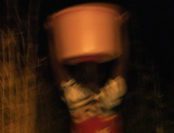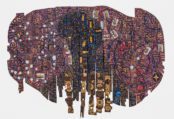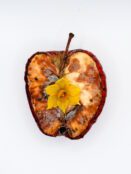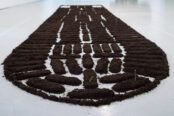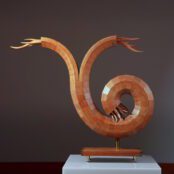“So who would win, a man who knew kung fu, or an adult male chimp?”
“The chimp would kill you.”
“Even if the man knew kung fu?”
“It would not matter if he knew kung fu. The chimp would kill you.”
“What about a man who knew kung fu against a drill?”
“The drill would win.”
“Oh, come on, they’re only this big…”
“But they can jump high. It would not matter if you knew kung fu, the drill would jump and take you.”
“What about this man,” Stu points at me, “he knows kung fu, and a small woman,” taps Monna on the shoulder, “what then?” The keeper just shakes his head.
It would not matter if he knew kung fu. The chimp would kill you
At this point I pitch in with, “Remember the teeth on those things? And you heard what they said about biting and tearing. They’ll take a big chunk out of you. One bite and it’s over.”
“Yeah, but one uppercut from you mate, and bang.” Palm against palm, accompanying overbite. Stu is warming to his theme.
Other explorations into the extent that Nigerians truly do not get irony included:
Stu, at the drill enclosure, “Can I go in there and feed them?”
“No, it would be suicide. Suicide.”
“What about her?” Points at Satu.
“No. They would tear her apart.”
“I dunno, mate, she’s tougher than she looks…”
And shortly after, “I think I’d like to breed them in Australia. Maybe I could just give one a sedative and put it in my bag.”
After a long pause the keeper replies, “I think that would be illegal.”
***
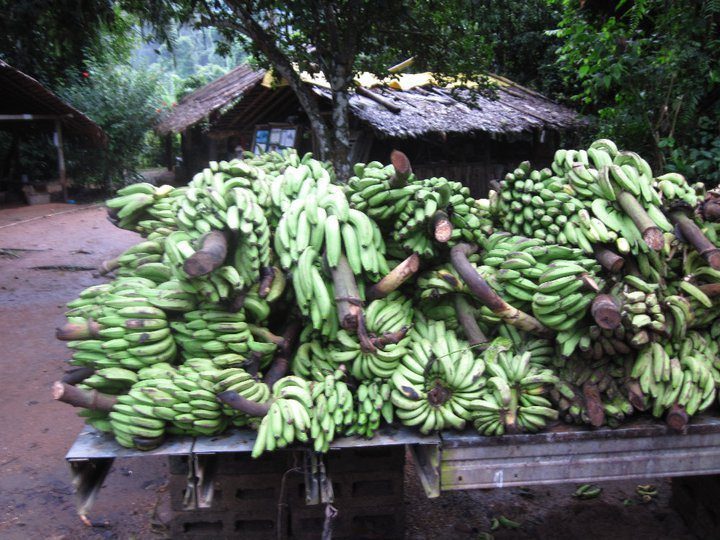 The Afi Mountain Ranch, or Pandrillus Monkey Ranch (I’m not quite sure what the official title is) is in Cross River State, near the Cameroon border and the more famous attraction of Obudu Cattle Ranch. It’s a working project set up to breed drill monkeys and reintroduce them to the wild, but it also has a limited amount of tourist accommodation as a revenue generator. There are only 3-8,000 drills left in the wild, and none, I don’t think, in Nigeria. Of the 126 kept here the first group are just about to be released. I hope the little buggers survive.
The Afi Mountain Ranch, or Pandrillus Monkey Ranch (I’m not quite sure what the official title is) is in Cross River State, near the Cameroon border and the more famous attraction of Obudu Cattle Ranch. It’s a working project set up to breed drill monkeys and reintroduce them to the wild, but it also has a limited amount of tourist accommodation as a revenue generator. There are only 3-8,000 drills left in the wild, and none, I don’t think, in Nigeria. Of the 126 kept here the first group are just about to be released. I hope the little buggers survive.
Afi also has a chimp sanctuary with 26 apes. These are all rescued – from being a pet, or from hunters, or illness etc. – so they’re not allowed to breed because there’s nowhere for them to be released to. The ones that have lived with humans are happy to come to the fence and have us watch them whilst they’re fed, but this is less than half, and you can hear the other ones somewhere in the undergrowth, too leery of man to come anywhere near.
The difference between the two sets of beasts – in separate enclosures accessed through paths in the jungle – is marked. The drills have dominant males, and one leader, but cluster anxiously around the gate, competing for the food that the keepers bring in with wheelbarrows. The lower ranking group go first, desperately snatching what they can and running to safe places (like balanced halfway along a vine, 30ft up) to eat their booty. These ones don’t come back for more. The higher ranking group take their time a bit more, and revisit the wheelbarrow, but they still squabble and actively fight with each other.
they’ve got canines the size of your little finger
One drill runs across in front of us on his hind legs, a fruit in each hand, looking mighty proud of himself as he splashes across the stream to an eating spot. One male sits to one side, and doesn’t take anything until the keeper explicitly takes it to him, at which point he reaches into the wheelbarrow and somewhat mournfully eats, maintaining his distance from the rest. This is a former dominant who’s been bested, and is in some sort of social limbo, accepted but not exactly welcomed.
When the whole group get agitated and screech together, it sounds like a horror movie noise, and is incredibly loud. And they’ve got canines the size of your little finger. With the thick rainforest and the electrified fences it’s all very reminiscent of Jurassic Park. When we’d been here about 5 minutes Stu asked the old Dutch manager guy if he thought the monkeys could breach the fences and take control during a storm, but apparently Pieter was as impervious to irony as his Nigerian colleagues.
In fact, Pieter struck me throughout the weekend as someone who was mild mannered and very pleasant but a few paces to the left of reality, if you know what I mean. If he wasn’t working in the middle of nowhere in Nigeria (celebrating, a lot, the fact that there was no mobile phone coverage), he’d strike you as the sort of guy that would hold down a reasonable but dull office job until the day that something snapped and he cut a swathe through the canteen with a butter knife and the pent up frustrations of decades of corporate boredom.
Lovely guy, of course.
The chimps, in contrast to the drills, amble up to the fence as if they’re the ones in charge. They all go and greet Willy, the alpha, before they do anything else, and none of them compete for food, they just sit and wait for the keeper to throw stuff to them, knowing that everyone will take their turn. Pablo, a grey haired chimp from Equatorial Guinea is the only one that doesn’t pay his respects, but apparently that’s because he’s got the beating of Willy and would be the leader if he hadn’t had an illness that had affected the joints in his hands and feet and left him unable to climb trees. Can’t have a boss man that can’t climb.
Still, Pablo is a dude, and pretty charismatic. Apparently he’s the peacemaker, or mediator of the group, and will be found sorting out any trouble. He has to sleep on the ground, unlike the others who all have their own nests of leaves in their own individual trees, but one of the females is his friend and she watches out for him, coming down to kill snakes if she sees them, and just generally getting his back. Pablo’s grey fur makes him look old, but apparently he’s not – it’s just down to where he’s from and the more savannah-like habitat there.
if you give them a coconut they’ll use tools to open them
All of this is told to us by a very cool (and I’m assured, hot) keeper that clearly has a really strong relationship with the chimps. One of the apes (I can’t remember his name, but his nickname was “Area Boy”) looks round the moment he says his name, and then he gets a high five out of him in exchange for some corn.
He tells us how intelligent these chimps are, and it’s not hard to believe. Some of the females are lounging around in poses reminiscent of rich Roman ladies at lunch, the kids are playing, and Pablo’s just quietly checking it all out. Apparently, if you give them a coconut they’ll use tools to open them, drain the milk and then keep the shells to use as cups for drinking. They have 30-40 different communication sounds, and a pretty complex social structure.
They’re also aggressive, pretty lethal and carnivores. Here, they’re being trained to be vegetarian, but in the wild they’d eat meat, including hunting monkeys like the drills. In a way it’s hard to believe when you see them, because they look so chilled out, but you can tell that you wouldn’t want to mess with one of them if things got nasty. They’re also known for throwing things at people with unerring accuracy if they feel threatened or disrespected, and Jens, who’s been here before, attests to how good they are with a well placed stone.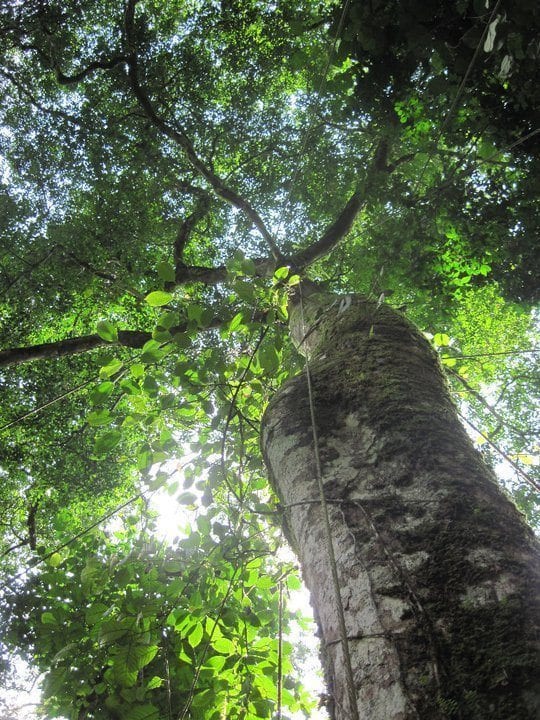
It’s a truly stunning place. It’s a hell of a long way from Abuja – about 12 hours there and 10 back in this case. I didn’t mind too much though, because it was nice just to get out of Abuja, and for all that other drivers were trying to kill us on a fairly regular basis we saw some good stuff. In no particular order – two guys on a motorbike balancing a double mattress on their head, another two guys with 4 goat kids between them, a goat being slaughtered on the side of the road, a “mobile policeman” with a goat he’d bought for his “old mother”, a hut in the middle of nowhere that was showing Liverpool vs. Malaysia, the entire exhaust falling off a petrol tanker in front of us and fortunately bouncing sideways not towards us, and a whole range of villages from the depressing and litter strewn, to the picturesque and well organised. And hundreds of surprised Nigerians shouting, “Oyibo!”
two guys on a motorbike balancing a double mattress on their head
The length of the drive wasn’t helped by the fact that we were in my car, which wasn’t exactly equipped for the last 100km or so of the journey. The first part of this was an insanely potholed road, but the real fun started on the 20km or so of mud road that got you up to the ranch itself. A fair few times I didn’t think we would make it, but it was only at one point that we actually had to get towed.
This was pretty lucky, as two guys passing in a pick up stopped and pulled us up a stupidly muddy hill that had deep rivulets scored into it. This quickly escalated into a bit of a scene as the local village poured out and all swarmed round the car. To be honest, without them (and Bart) pushing we probably wouldn’t have done it, and just when we got to the top, the tow rope snapped. It felt like a lot of people around us at this point, but whilst a couple of guys got aggressive asking for cash, mostly everyone was just curious, and having paid the two guys that actually had the pick up, we were on our way. A few more scares, and some moments where I thought I’d eviscerated the car but we arrived safe.
Kia – the Power to Surprise. A ridiculous strapline, but one that I will now not hear mocked. The car has definitely become a “she” now, and I am proud of her.
The camp itself is basic, but pretty magical. Surrounded by proper rainforest, the kind I didn’t think existed in Nigeria, and with basic but beautiful cabins. Alongside seeing the monkeys there was a canopy walk that took us up to around 25 metres, and a swim in a set of waterfalls.
All in all, a good weekend.
***





